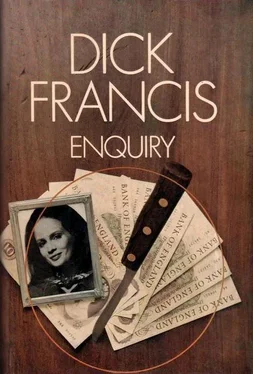I made it without mishap down the stairs and found Tony had commandeered Poppy’s estate car for the journey. The back seat lay flat so that I could lie instead of sit, and there were even cushions for my shoulders and head.
‘Poppy’s idea,’ Tony said briefly, helping me climb in through the rear door. ‘Great girl.’
‘She sure is,’ I said gratefully, hauling in the crutches behind me. ‘Lose no time, now, friend.’
‘You sound worried.’ He shut the doors, switched on and drove away with minimum waste of time.
‘I am, rather. Grace Roxford is unbalanced.’
‘But surely not dangerous?’
‘I hope not’
I must have sounded doubtful because Tony’s foot went heavily down on the accelerator. ‘Hold on to something,’ he said. We rocked round corners. I couldn’t find any good anchorage: had to wedge my useful foot against the rear door and push myself off the swaying walls with my hands.
‘O.K.?’ he shouted.
‘Uh... yes,’ I said breathlessly.
‘Good bit of road just coming up.’ We left all the other traffic at a standstill. ‘Tell me if you see any cops.’
We saw no cops. Tony covered the eighteen miles through Berkshire in twenty-three minutes. We jerked to a stop outside Cranfield’s house, and the first thing I saw was that there was no one in the small grey Volkswagen standing near the front door.
Tony opened the back of the car with a crash and unceremoniously tugged me out.
‘She’s probably sitting down cosily having a quiet cup of tea,’ he said.
She wasn’t.
Tony rang the front door bell and after a lengthy interval Mrs Cranfield herself opened it.
Not her usual swift wide-opening fling. She looked at us through a nervous six inches.
‘Hughes. What are you doing here? Go away.’
‘Roberta asked me to come. To see Grace Roxford.’
‘Mrs Roxford is no longer here.’ Mrs Cranfield’s voice was as strung up as her behaviour.
‘Isn’t that her car?’ I pointed to the Volkswagen.
‘No,’ she said sharply.
‘Whose is it, then?’
‘The gardener’s. Now Hughes, go away at once. Go away.’
‘Very well,’ I said, shrugging. And she instantly shut the door.
‘Help me back into the car,’ I said to Tony.
‘Surely you’re not just going ?’
‘Don’t argue,’ I said. ‘Get me into the car, drive away out through the gates, then go round and come back in through the stable entrance.’
‘That’s better.’ He shuffled me in, threw in the crutches, slammed the door and hustled round to the driving seat.
‘Don’t rush so,’ I said. ‘Scratch your head a bit. Look disgusted.’
‘You think she’s watching?’ He didn’t start the car: looked at me over his shoulder.
‘I think Mrs Cranfield would never this side of doomsday allow her gardener to park outside her front door. Mrs Cranfield was doing her best to ask for help.’
‘Which means,’ he added slowly, ‘That Grace Roxford is very dangerous indeed.’
I nodded with a dry mouth. ‘Drive away, now.’
He went slowly. Rolled round into the back drive, accelerated along that, and stopped with a jerk beside the stables. Yet again he helped me out.
‘There’s a telephone in the small office in the yard,’ I said. ‘Next to the tackroom. Look up in the classified directory and find a local doctor, Tell him to come smartish. Then wait here until Dexter Cranfield comes back with the horses, and stop him going into the house.’
‘Kelly, couldn’t you be exaggerating...?’
‘I could. Better to be on the safe side, though.’
‘I’ll never be able to stop Cranfield.’
‘Tell him no one ever believes anything tragic will happen until it has.’
He looked at me for two seconds, then wheeled away into the yard.
I peg-legged up the back drive and tried the back door. Open. It would be. For Cranfield to walk easily through it. And to what?
I went silently along into the main hall, and listened. There was no sound in the house.
Tried the library first, juggling the crutches to get a good grip on the door handle, sweating lest I should drop one with a crash. Turned the handle, pressed the door quietly inwards.
The library was uninhabited. A large clock on the mantel ticked loudly. Out of time with my heart.
I left the door open. Went slowly, silently, towards the small sitting-room beside the front door. Again the meticulously careful drill with the handle. If they’d seen me come, they would most probably be in this room.
The door swung inwards. Well oiled. No creaks. I saw the worn chintz covers on the armchairs, the elderly rugs, the debris of living, scattered newspapers, a pair of spectacles on some letters, a headscarf and a flower basket. No people.
On the other side of the hall there were the double doors into the large formal drawing-room, and at the back, beyond the staircase, the doors to the dining-room and to Dexter Cranfield’s own study, where he kept his racing books and did all his paper work.
I swung across to the study, and opened the door. It was quiet in there. Dust slowly gravitated. Nothing else moved.
That left only the two large rooms downstairs, and the whole of upstairs. I looked at the long broad flight uneasily. Wished it were an escalator.
The dining-room was empty. I shifted back through the hall to the double doors of the drawing-room. Went through the crutch routine with more difficulty, because if I were going in there I would need both doors open, and to open both doors took both hands. I managed it in the end by hooking both crutches over my left arm like walking sticks, and standing on one leg.
The doors parted and I pushed them wide. The quarter acre of drawing-room contained chairs of gold brocade upholstery, a pale cream Chinese carpet and long soft blue curtains. A delicate, elegant, class-conscious room designed for Cranfield’s glossiest aspirations.
Everything in there was motionless. A tableau.
I hitched the crutches into place, and walked forward. Stopped after a very few paces. Stopped because I had to.
Mrs Cranfield was there. And Roberta. And Grace Roxford. Mrs Cranfield was standing by the fireplace, hanging on to the shoulder-high mantel as if needing support. Roberta sat upright in an armless wooden chair set out of its usual place in a large clear area of carpet. Behind her and slightly to one side, and with one hand firmly grasping Roberta’s shoulder, stood Grace Roxford.
Grace Roxford held the sort of knife used by fishmongers. Nearly a foot long, razor sharp, with a point like a needle. She was resting the lethal end of it against Roberta’s neck.
‘Kelly!’ Roberta said. Her voice was high and a trifle wavery, but the relief in it was overwhelming. I feared it might be misplaced.
Grace Roxford had a bright colour over her taut cheekbones and a piercing glitter in her eyes. Her body was rigid with tension. The hand holding the knife trembled in uneven spasms. She was as unstable as wet gelignite; but she still knew what she was doing.
‘You went away, Kelly Hughes,’ she said. ‘You went away.’
‘Yes, Grace,’ I agreed. ‘But I came back to talk to Roberta.’
‘You come another step,’ she said, ‘And I’ll cut her throat.’
Mrs Cranfield drew a breath like a sob, but Roberta’s expression didn’t change. Grace had made that threat already. Several times, probably. Especially when Tony and I had arrived at the front door.
She was desperately determined. Neither I nor the Cranfields had room to doubt that she wouldn’t do as she said. And I was twenty feet away from her and a cripple besides.
‘What do you want, Grace?’ I said, as calmly as possible.
‘Want? Want?’ Her eyes flickered. She seemed to be trying to remember what she wanted. Then her rage sharpened on me like twin darts, and her purpose came flooding back.
Читать дальше












